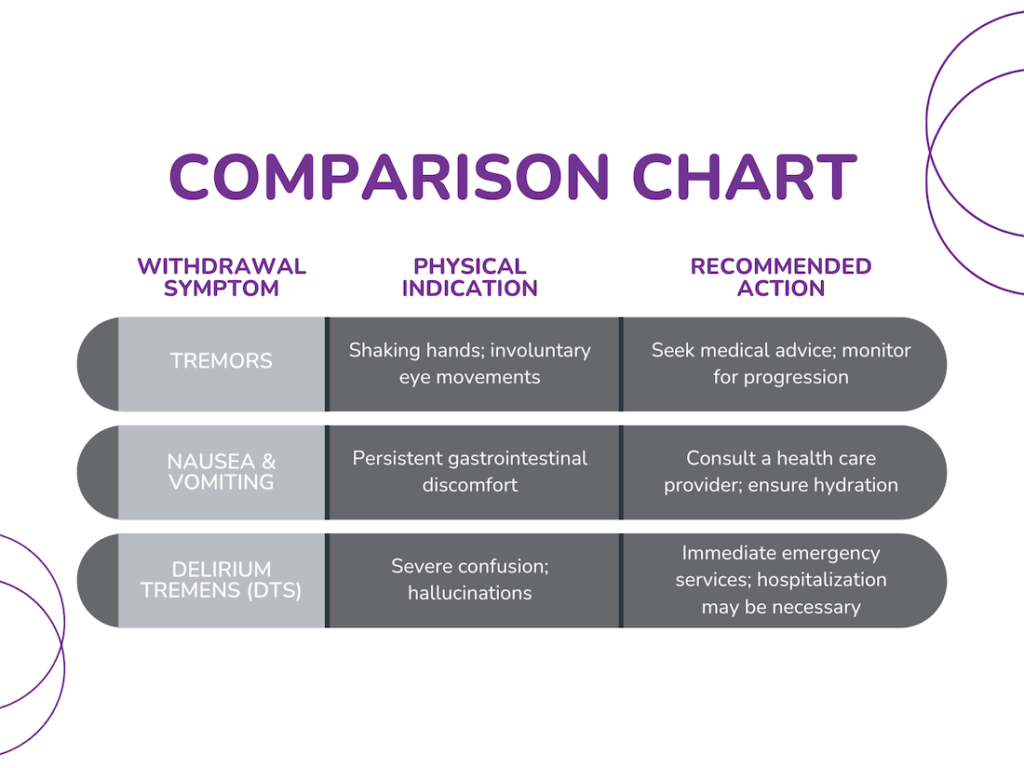Have you noticed changes in a loved one that cause concern about potential alcohol abuse? This article shines a light on the critical signs of alcoholism, offering insights into behavioral and physical indicators, including symptoms reminiscent of hypertension, which may emerge from prolonged alcohol misuse. Readers will benefit from understanding the complexities of alcohol dependence, such as recognizing emotional and psychological shifts that could indicate a deeper issue. The content will address alcoholics anonymous sign up processes and the role of psychotherapy in recovery, equipping you with knowledge and practical guidance to support your loved ones on their journey to sobriety. Addressing this sensitive topic, our clear, concise approach will help pinpoint signs you may have overlooked, including those akin to fetal alcohol syndrome symptoms, and provide a pathway to the help needed.
Key Takeaways
- Identifying signs of alcoholism early can lead to timely intervention and better recovery outcomes
- The impact of alcoholism on mental health extends to both the individual and their loved ones
- Misconceptions about alcoholism hinder support and recovery; education is key to addressing this
- Emotional and psychological signs of alcohol dependency are as critical as physical indicators
- Supportive conversation and professional help are vital for a loved one’s path to recovery
Understanding Alcoholism and Its Impact on Loved Ones
Alcoholism, clinically known as alcohol use disorder, is characterized by an inability to manage drinking habits, often leading to detrimental health consequences, including stroke and irregular heart rate. Individuals seeking sobriety through resources like Alcoholics Anonymous may show signs that are both physiological and behavioral in nature. As alcohol addiction takes hold, the mental health of family members is frequently impacted, with emotional strain stemming from misunderstandings and assumptions about the nature of addiction. The following sections delve into the nuances of alcoholism, identifying its signs, the ripple effects on loved ones, and challenging the common misconceptions surrounding this condition.
Defining Alcoholism and Its Symptoms
Alcoholism, as defined by the Substance Abuse and Mental Health Services Administration, presents a heightened risk for chronic health issues such as pancreatitis and cognitive impairments linked to wet brain symptoms, which include confusion and difficulty with coordination. Key indicators often manifest through physiological distress, such as persistent vomiting, but also through behavioral changes that signal a loss of control over alcohol consumption. Understanding these signs in loved ones enables early intervention, potentially reducing the long-term consequences of sustained substance abuse and offering a pathway to recovery and better mental health for all affected.
The Emotional and Psychological Effects on Family Members
The emotional and psychological toll on family members of those struggling with alcoholism cannot be overstated. Observing a loved one battling alcohol detox symptoms, which may include acute emotional distress alongside physical discomfort, can create a profound desire in family members to seek helpful interventions. Moreover, witnessing the long-term health repercussions, like fatty liver disease caused by chronic alcohol abuse, often leads to significant emotional strain and a sense of urgency to support their loved one’s journey towards sobriety.
The narrative of alcoholism’s impact on loved ones also intersects with stories of opioid misuse, as families are sometimes confronted with multiple substance dependencies simultaneously. This complexity demands a nuanced understanding and a multifaceted response:
- Recognizing the signs of distress in oneself and others that might indicate the need for professional mental health support.
- Identifying and addressing the emotional burdens that are commonly carried by those who live with someone experiencing alcohol detox symptoms.
- Seeking education on the effects of substances like alcohol and opioids on both the individual and familial health.
Common Misconceptions About Alcohol Addiction
Addressing the common misconceptions surrounding alcohol addiction is paramount for providing the right support to individuals in need. Many people mistakenly attribute FASD symptoms, a condition linked to alcohol abuse during pregnancy, to poor child-rearing practices, thereby overlooking the necessity for early consultations with a treatment provider. The American Academy of Family Physicians emphasizes the importance of recognizing how stress and other environmental factors influence addiction, challenging the idea that willpower alone determines recovery outcomes. It’s critical to engage with national resources designed to correct misunderstandings and aid families to navigate the complexities of alcoholism and its far-reaching effects.
Recognizing Behavioral Signs of Alcoholism
Identifying the behavioral signs of alcoholism in loved ones is instrumental for timely intervention and facilitating progress towards sobriety. These signs may present as shifts in daily routines and habits, increased secretive or isolated drinking patterns, a neglect of responsibilities at home or in the workplace, and social withdrawal from friends and activities. While each of these indicators could be an impassioned plea for assistance, it is advisable to engage a mental health professional or seek guidance from resources such as SAMHSA to navigate detox and recovery processes effectively. This section explores how these behavioral changes, often linked to the stressors that precipitate alcohol use, could signal the need for supportive measures or medical intervention to prevent further health risks, including cancer.
Changes in Daily Routines and Habits
Alterations in daily routines and habits serve as significant indicators of alcohol addiction, often preceding the development of physical dependence. One may notice a loved one neglecting former interests, displaying patterns indicative of attention deficit hyperactivity disorder (ADHD), or missing commitments, which may signify a growing preoccupation with alcohol. Additionally, for those of childbearing potential, deviations in behavior around pregnancy can hint at fears related to alcohol’s harm to fetal health, thus they might misuse alcohol as a coping mechanism despite the known risks. It’s paramount to intervene with resources like naltrexone, an FDA-approved medication for alcohol dependence, and to guide them toward structured support systems to address these life-altering signs.
Secretive or Isolated Drinking Patterns
When a loved one begins showing patterns of secretive or isolated drinking, it may be a sign of an emerging alcohol problem. These behaviors, often an individual’s attempt to hide their disorder from friends and family, can disrupt relationships and daily life. Healthcare professionals recognize that increases in solitary consumption can be linked to signs of psychomotor agitation, high blood pressure, or an impaired immune system—all potential health risks correlated with excessive alcohol consumption. Promptly addressing these changes by consulting with addiction specialists can be a critical step in protecting the well-being of those grappling with alcoholism.
Neglect of Responsibilities at Home and Work
When an individual begins to neglect responsibilities, both at home and in the workplace, it may signal a deeper struggle with alcohol use. This withdrawal from duties often correlates with attempts at coping with the challenges of life, potentially manifesting in prolonged absences from work or a decline in household management. A person may frequently resort to alcohol detox measures after excessive consumption of beverages like wine, which also elevates the risk for cardiovascular disease. Consulting a psychiatrist or addiction specialist can offer insights and strategies for confronting this pattern, enabling affected families to seek the necessary help and reclaim a sense of stability and health in their lives.
Social Withdrawal From Friends and Activities
When an individual starts to distance themselves from friends and disengage from activities that once brought them joy, these behaviors may indicate a serious drinking problem. Observing such social withdrawal can also be a sign that their liver is beginning the healing process from alcohol damage; the body is capable of remarkable recovery, but the path to healing is often accompanied by changes in behavior as the brain recovers from potential damage. It is vital for concerned parties to observe these behavioral signs closely and consider consulting with a physician or addiction specialist for comprehensive support and guidance.
Identifying Physical Indicators of Alcohol Abuse
Recognizing the physical indicators of alcoholism in loved ones is a crucial step in guiding them toward substance abuse treatment. Notable changes in physical appearance, the emergence of health issues related to excessive drinking, and the presence of withdrawal symptoms are clear signs that should prompt screening for alcohol use disorder. This section outlines the importance of monitoring variations in mood, sleep patterns, and the potential increased risk of conditions such as tuberculosis as a result of heavy drinking. These indicators not only signal the need for intervention but also underscore the importance of professional support for recovery.
Noticeable Changes in Physical Appearance
Among the signs and symptoms of alcoholism, noticeable changes in physical appearance are often some of the most visible to loved ones. These may include unexplained bruises or injuries, a negligence in personal grooming, or sudden weight changes. Observing these alterations warrants a discussion with a health care provider, as they could indicate health issues like gastritis or pain related to internal organ damage. Recognizing these changes can be critical in preventing relapse and encouraging a loved one’s commitment to recovery:
- Unexplained injuries or bruising may suggest falls or accidents while intoxicated.
- Neglect in personal grooming can be a sign of decreased self-care, common in individuals struggling with substance abuse.
- Sudden weight changes, whether loss or gain, might signify metabolic issues or decreased liver function, often associated with heavy drinking.
Health Issues Related to Excessive Drinking
Excessive drinking often leads to a host of health issues that serve as key identifiers of alcohol abuse. For instance, persistent nausea, a common symptom, may arise from alcohol’s irritation of the stomach lining, while insomnia indicates the disruption of natural sleep patterns due to alcohol’s influence on the brain’s chemistry. Should the individual experience a mental disorder, such as increased anxiety or depression, this too could be exacerbated by the immoderate consumption of standard drinks. Immediate consultation with a healthcare professional is advised to discuss potential medication or treatments that can alleviate these symptoms and aid in recovery.
Signs of Withdrawal Symptoms
Withdrawal symptoms are acute physical and psychological effects that occur when an alcoholic stops or significantly reduces alcohol consumption after prolonged use. According to the Centers for Disease Control and Prevention, symptoms can range from tremors, especially noticeable in the hands and eyes, to more severe conditions like delirium tremens (DTs), which the Mayo Clinic notes as potentially life-threatening. It’s critical for family members to recognize these withdrawal indicators, as they highlight the body’s dependence on liquor and may necessitate medical intervention for safe detoxification.

Emotional and Psychological Clues of Alcohol Dependence
The emotional and psychological symptoms in someone struggling with alcoholism are often as telling as the physical ones. Mood swings, irritability, and defensiveness when confronted about drinking can all point to underlying issues, such as alcohol withdrawal syndrome symptoms. Anxiety or depression may also intensify, adversely affecting an individual’s health. Recognizing these signs is crucial for providing better help and understanding the toxicity alcohol brings, not just to the liver but to one’s mental well-being. This section will explore these emotional and psychological indicators in detail, offering insights into their significance in identifying an alcohol dependence.
Mood Swings and Irritability
Mood swings and irritability are often alarming emotional indicators of alcohol dependence, which may emerge even in social settings that include the casual consumption of beer. These alterations in temperament can be a manifestation of the underlying distress associated with alcohol misuse, as outlined in the Diagnostic and Statistical Manual of Mental Disorders. In particular, women seeking help from groups like Women for Sobriety might report such symptoms frequently, underscoring both the universal and unique stressors women face in the community tied to alcohol addiction. Promptly identifying these signs and acknowledging their significance can be a decisive step towards guiding individuals on a supportive path to recovery, improving both their mental well-being and skin health, which often deteriorates with persistent alcohol abuse.
Increased Anxiety or Depression
Increased anxiety or depression are significant psychological manifestations that may denote alcohol addiction symptoms beyond the realm of normal stress or mood fluctuations. A professional in psychiatry may identify these emotional disturbances following episodes of binge drinking, which could disrupt the individual’s typical biochemical balance leading to changes such as tachycardia and heightened nervousness. It is critical for observers to understand that such mood disorders, when linked to substance misuse, suggest an urgent need for intervention to address the underlying issues of the drug and alcohol dependence.
Defensiveness When Confronted About Drinking
When a patient exhibits defensiveness in response to discussions about their drinking habits, this behavior is a compelling emotional sign of possible alcoholism. The defensiveness can mask underlying issues that might include symptoms like fever or dehydration, which are often ignored or minimized. Healthcare professionals, backed by guidance from the National Institutes of Health, may recommend cognitive behavioral therapy as a means to address these defensive attitudes and help the individual confront their alcohol use in a constructive manner.
How to Approach a Loved One Suspected of Alcoholism
Approaching a loved one about their potential challenges with alcohol requires sensitivity, planning, and the most appropriate strategies. Preparing for a supportive conversation, selecting the optimal time and setting, communicating concerns effectively, and encouraging professional help are all crucial steps for initiating a potentially life-altering dialogue. This section will provide guidance on handling these sensitive discussions, considering factors such as alcohol intoxication levels, signs of delirium tremens, and understanding the guidelines set by the American Psychiatric Association for assessing alcohol-related disorders, including evaluating stomach health and blood alcohol content.
Preparing for a Supportive Conversation
Preparing for a supportive conversation with a loved one suspected of struggling with alcoholism requires thoughtful consideration and sensitivity. It is crucial to gather credible information regarding the specific ways alcohol affects the pancreas, induces delirium, leads to disease, and impacts the brain to provide a clear and factual basis for discussion. This approach helps in delivering a message of concern that is rooted in care and understanding, rather than judgment, thereby enhancing the likelihood of a receptive dialogue that paves the way for positive change.
Choosing the Right Time and Setting
Identifying the right moment and environment is essential when discussing potential alcohol use disorders with a loved one. Professionals in psychology and addiction recommend a private, quiet setting free of distractions to create an atmosphere of safety and openness. Initiating these conversations when a loved one is sober and receptive, rather than during periods of intoxication or emotional distress, is key. This cautious approach respects the complex interplay of factors like genetics and risks associated with alcohol-related conditions such as hepatitis, and encourages an honest, forthright dialogue that can lead to recognition and help.
Communicating Your Concerns Effectively
Effectively communicating concerns about a loved one’s suspected alcoholism starts with an open-hearted dialogue grounded in empathy. It is crucial to discuss observable signs such as those related to alcohol withdrawal syndrome, escalating anxiety, or the potential onset of liver disease, as these can be strong indicators of addiction. The approach should be non-confrontational, focusing on the individual’s well-being and expressing a desire to support their journey towards recovery, possibly through avenues like SMART Recovery. Relaying observations about inflammation or changes in behavior can help a loved one recognize the impact of their drinking and feel motivated to seek help.
- Choose a quiet, private setting for the conversation to prevent distractions and facilitate focus.
- Ensure the discussion is centered on concern and support, not judgment or blame.
- Reference specific examples of concerning behavior and its impacts, emphasizing the benefits of seeking professional help.
Encouraging Professional Help
Encouraging a loved one to seek professional help for a substance use disorder can be a delicate process, particularly if they exhibit drinking too much alcohol symptoms that exacerbate familial stress, such as irritability or changes in habit. Critical to this approach is the framing of the situation—highlighting the potential dangers of alcohol and pregnancy, for instance, or how prolonged irritation of the stomach lining can lead to more severe health complications. By presenting the guidance of a healthcare professional as a supportive resource rather than a punitive measure, one can make the option of treatment more accessible and less intimidating for those struggling with the decision to change.
Supporting Your Loved One Through Recovery
Navigating the journey of recovery with a loved one struggling with alcoholism is a multi-faceted endeavor. It involves exploring treatment options together, extending ongoing emotional support, setting healthy boundaries to prevent incidents like blackout or violence, and taking care of one’s own well-being to manage the pressure. Parents and family members must be equipped to offer the right support, encouraging their loved one to refrain from drink and guiding towards a healthier future. The forthcoming topics are designed to provide guidance on achieving these goals through practical support strategies and personal resilience.
Exploring Treatment Options Together
Exploring treatment options together with a loved one facing alcoholism can solidify their path to recovery, making the process less daunting and more manageable. Considering dual diagnosis treatment centers could address both substance abuse and any co-occurring mental health conditions, acknowledging the increased risk factor for relapse if these are not treated concurrently. Family support can alleviate the fear and help the person avoid risky behaviors such as driving under the influence. A collaborative approach can empower individuals with the feeling of being understood and supported, setting a foundation for sustained sobriety and well-being.
Providing Ongoing Emotional Support
Providing ongoing emotional support is critical for those recovering from alcoholism, as the journey is often fraught with challenges, including the management of alcohol poisoning symptoms. Ensuring access to essential resources, such as suitable insurance plans that cover therapy and medicine, can alleviate financial stress that may otherwise hinder recovery. Well-informed about the treatment regimens available through American Addiction Centers, family members are better positioned to support their loved one’s long-term sobriety, affirming their commitment to wellness rather than merely abstinence from substance use.
Setting Healthy Boundaries
Establishing healthy boundaries is imperative for those aiding a loved one in navigating the challenges of alcoholism. Such boundaries help protect against the detrimental impacts of alcohol misuse, which can range from tremors and injury to serious conditions like dementia. A firm yet compassionate approach, informed by the National Institute on Alcohol Abuse and Alcoholism, can guide family members in setting limits that foster a recovery-friendly environment. Furthermore, the incorporation of treatment options, like the prescription medication acamprosate, can assist in reducing cravings and preventing relapse, thereby bolstering the recovery process within these established boundaries.
Taking Care of Your Own Well-Being
As individuals support their loved ones through recovery from alcoholism, it is essential to remain vigilant about their own well-being. The stress of managing a loved one’s addiction can lead to forgetfulness, decreased memory retention, or even emotional and physical exhaustion reminiscent of a hangover. To prevent these side effects, one must prioritize self-care, gathering information to understand the progression of conditions like alcoholic hepatitis or the risks of seizure associated with acute alcohol withdrawal. In this arduous journey, one’s health must take precedence to provide unwavering support while standing as a pillar of resilience and stability for their recovering loved one.
Conclusion
Identifying signs of alcoholism in loved ones is crucial for early intervention and the journey towards recovery. Recognizing both the subtle behavioral changes and the more pronounced physical symptoms can signal the need for immediate support and professional help. Effective communication and understanding the psychological implications of alcohol dependence are vital to offer appropriate guidance and treatment options. In addressing alcoholism, the well-being of both the affected individuals and their families hinges on awareness, proactive measures, and compassionate support.






